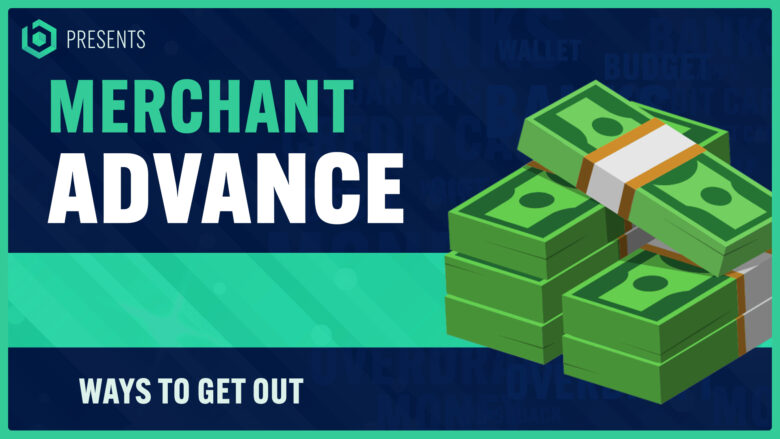Got a Merchant Cash Advance (MCA) that’s becoming a financial strain? I’ve been there and, through extensive research, discovered the average annual percentage rate for an MCA can soar to a staggering 200% or more.
This post provides practical strategies on how to escape the clutches of high-cost MCAs, detailing alternatives from loan consolidation to negotiation tactics with professionals. Ready? Your guide out of the cash advance maze starts here!
- Increasing business profits is a direct way to speed up Merchant Cash Advance (MCA) repayments. Strategies such as enhancing brand visibility and implementing customer loyalty programs can help.
- Switching payment processors can alleviate the financial strain of an MCA by negotiating better rates, reducing reliance on credit card sales, and accessing flexible payment options.
- Loan consolidation involves taking out a single loan with lower interest rates to pay off multiple high-interest MCAs, simplifying repayment into one manageable monthly installment.
- Negotiating a debt settlement with the help of professionals who specialize in MCAs increases the likelihood of successfully paying off the advance. They can navigate lender tactics and customize strategies based on your specific situation.
Can I Get Out Of Paying My Merchant Cash Advance Back?

Let’s get straight to the point: There are no easy outs when it comes to Merchant Cash Advances (MCAs). Once you’ve signed the agreement, you’re legally bound to fulfill your repayment obligations.
However, there are certain strategies that can help alleviate financial strain. For starters, increasing business profits is a direct way of speeding up MCA repayments. Look into ways to expand business operations like enhancing brand visibility and customer loyalty programs.
Another tactic involves switching payment processors if your MCA provider requires the use of a specific one as part of their terms. Engaging Factoring companies is also an option; they buy slow-paying invoices from your receivables at a discount, providing quick cash for immediate expenses or pay-offs.
A word of caution, though – this relief might be short-term and could ultimately increase overhead costs in the long run.
Finally, professional negotiation shouldn’t be discounted as an exit strategy from MCAs. Debt settlement attorneys or agencies can work with lenders on your behalf to negotiate lower payments or reduce total debt figures – sometimes even by half! Just make sure any professionals you engage have proven experience in dealing with commercial debt delinquency cases before handing over control of your accounts.
Understanding Merchant Cash Advance
A Merchant Cash Advance, often referred to as MCA, can be a lifeline for businesses in need of quick access to funds. It’s not your conventional loan; instead, it operates under the conceptual framework of an advance against future credit card and debit card sales.
To put it simply: you receive cash from your MCA provider, and in return, they procure a predetermined percentage from your daily credit or debit card transactions.
Comprehending how MCAs work is crucial before you dive into one. The payment policy of this type of advance is different since there are no set payments – it fluctuates with your business revenue volume.
On days when business is booming, you’ll pay more towards settling the advance compared to slower sales days where deductions will be less. This seemingly flexible repayment plan makes MCAs an attractive option for retail establishments that experience seasonal variations in their income streams.
Remember that while MCAs provide fast cash and have lenient credit requirements compared to traditional bank loans, they come at premium pricing. The balance between quick access to funds and higher costs must always factor into your overall business budgeting efforts – ensuring both sustainability and profitability within the enterprise over time.
The Benefits of a Merchant Cash Advance

Merchant Cash Advances offer quick access to funds, flexible credit requirements, and no risk to assets. Want to learn more about how they can benefit your business? Read on!
Quick access to funds
As a business owner, there will be times when you need fast cash to keep your operations running smoothly. That’s where Merchant Cash Advance from Talus Pay comes into play. This service provides businesses with an influx of funds swiftly, unlike traditional loans, which can take weeks or even months to process.
Immediate access to funds offers a lifeline for small businesses that often grapple with unexpected expenses or opportunities they want to capitalize on. Whether it’s restocking inventory at short notice or implementing an urgent product upgrade – having quick and easy access to capital via Merchant Cash Advance allows you not just survival but also growth.
As part of the Talus Pay family, you are then free from financial strain and empowered to continue focusing on the daily running of your enterprise without disruptions.
Flexible credit requirements
When it comes to getting a merchant cash advance, one of the major benefits is the flexible credit requirements. Unlike traditional loans from banks, which often require a high credit score and extensive documentation, merchant cash advances are more accessible to small businesses with less-than-perfect credit.
This means that even if your credit history isn’t stellar, you still have a good chance of being approved for a cash advance. It’s an excellent option for business owners who need fast access to funds without the stringent credit requirements of conventional loans.
No risk to assets
One of the major benefits of a merchant cash advance is that it poses no risk to your business assets. Unlike traditional loans where you may have to put up collateral such as property or equipment, a merchant cash advance doesn’t require any form of security.
This means that even if you’re unable to repay the advance according to the agreed terms, your assets will remain safe from seizure or repossession. So you can access the funds you need without worrying about putting your business assets on the line.
6 Strategies to Pay off a Merchant Cash Advance

To pay off a Merchant Cash Advance, you can increase your business profits, switch payment processors, consolidate loans, negotiate a debt settlement with professional assistance, replace the cash advance with a low-rate term loan, or use asset-backed loans for repayment.
1. Increase business profits
To increase business profits, it’s important to implement strategies that can help maximize your revenue. One effective way is by focusing on increasing your customer base and sales volume. Talus Pay offers merchant accounts and payment solutions designed to boost business profits.
By integrating their services with financial institutions, they can establish themselves as trusted advisors for commercial banking customers, providing valuable insights on how to grow your business.
Additionally, Talus Pay’s cash discount program can potentially save you money and increase your profits. With customizable point-of-sale systems like the Clover Product Suite and user-friendly terminals such as the PAX A920 Terminal and SwipeSimple Card Reader, transactions become smoother, leading to a more efficient operation that allows you to focus on driving sales.
2. Switch payment processors
One option to consider when trying to get out of a merchant cash advance is to switch payment processors. This can help you in several ways:
- Improved Cash Flow: By switching to a new payment processor, you may be able to negotiate better rates and lower transaction fees. This can help improve your cash flow and free up more money to pay off your cash advance.
- Reduced Dependence on Credit Card Sales: Many merchant cash advances are tied to your credit card sales. By switching payment processors, you may be able to reduce your reliance on credit card transactions and diversify your revenue streams. This can give you more control over your finances and make it easier to pay off the advance.
- Access to Flexible Payment Options: Some payment processors offer flexible payment options, such as daily or weekly settlements, instead of the traditional monthly settlements. This can help you better manage your cash flow and allocate funds toward paying off your cash advance.
- Better Customer Support: If you’re facing financial difficulties and need assistance with managing your merchant cash advance, switching payment processors may give you access to better customer support. They may be able to provide guidance or alternative solutions that can help you navigate this challenging situation.
- It’s important to carefully review the terms and conditions of your existing agreement before making any decisions about switching payment processors.
- Assess whether there are any penalties or fees associated with terminating or changing your current merchant services agreement.
- Consider reaching out to potential new payment processors for quotes and compare their rates, fees, contract terms, and overall reputation in the industry.
- Seek advice from financial professionals or industry experts who can provide guidance on the best course of action for your specific situation.
3. Loan consolidation
If you’re looking for a way to pay off your merchant cash advance, one option you might consider is loan consolidation. This involves taking out a single loan with lower interest rates and using it to pay off your existing debts.
By consolidating multiple high-interest advances into one manageable payment, you can potentially reduce your monthly expenses and make it easier to repay what you owe. Keep in mind that loan consolidation may require good credit and financial stability, so be sure to assess your situation before pursuing this option.
Remember, working with a professional who specializes in debt settlement or merchant cash advances can help guide you through the process and increase your chances of successfully paying off your advance.
4. Negotiate a debt settlement with the help of a professional
When facing the challenge of paying off a merchant cash advance, one option to consider is to negotiate a debt settlement with the help of a professional. Working with a knowledgeable expert who specializes in merchant cash advance debt can be beneficial for several reasons.
Firstly, they understand the intricacies of these types of debts and can guide you through the negotiation process effectively. They have experience working with lenders and know how to navigate their tactics and strategies.
A professional negotiator will assess your specific situation, taking into account factors such as your business’s financial standing and ability to repay the debt. They will then work on your behalf to negotiate favorable terms with the lender, aiming for reduced interest rates or even principal reductions.
It’s important to remember that negotiating a debt settlement requires careful planning and expertise. Professionals in this field have extensive knowledge of laws surrounding merchant cash advances and are skilled at advocating for their clients’ best interests.
By enlisting their help, you increase your chances of securing more manageable repayment terms that align with your business’s financial capabilities.
5. Replace a cash advance with a low-rate term loan
If you’re looking for a way to get out of a merchant cash advance, one strategy you can consider is replacing it with a low-rate term loan. Unlike cash advances, which often come with high-interest rates and short repayment terms, a term loan offers lower interest rates and longer repayment periods.
This can help alleviate some of the financial strain that comes with paying off an expensive cash advance.
By taking out a low-rate term loan, you can consolidate your debt into one manageable payment and potentially save money on interest charges. This option allows you to spread out your repayments over a longer period of time, making it easier to stay on top of your finances.
When exploring this option, it’s important to carefully consider the terms and conditions of the new loan. Look for lenders who offer competitive interest rates and flexible repayment schedules that align with your business revenue volume.
6. Use asset-backed loans to pay off cash advances
Asset-backed loans can be an effective strategy to pay off your merchant cash advances. By leveraging your business assets, such as equipment or inventory, you can secure a loan with lower interest rates and longer repayment periods.
This allows you to consolidate your debt and make manageable monthly payments. With Talus Pay’s solutions, you’ll have the opportunity to access fast cash for growth without relying on traditional bank loans.
So, if you’re looking to get out of a merchant cash advance, consider using asset-backed loans as a viable option for financial relief.
Our Takeaway
Getting out of a merchant cash advance may seem daunting, but with the right strategies, it is possible to regain control of your finances. By increasing business profits, switching payment processors, negotiating debt settlements or exploring alternative loan options, you can pave the way toward financial freedom.
Remember to seek professional advice when needed and stay proactive in finding solutions that work best for your business. Don’t let a merchant cash advance hold you back – take charge and reclaim your financial independence today.
Article Sources & Helpful Links
Here are some helpful links that may help you learn more:
- Talus Pay Official Website: The official website of Talus Pay, a merchant services provider mentioned in the article.
- Clover Official Website: The official website of Clover, a point-of-sale system provider mentioned in the article.
- SBA Loans: A page on the U.S. Small Business Administration’s website that provides information about various loan programs for small businesses.
- Federal Reserve on Money Supply: An article from the Federal Reserve explaining the concept of money supply, which is relevant to understanding the financial market context of merchant cash advances.
- NerdWallet Homepage: A financial advice website that provides a variety of resources on topics such as small business loans, which are an alternative to merchant cash advances.
- Investopedia Homepage: A comprehensive resource for understanding various financial and economic concepts, including merchant cash advances and other forms of business financing.
How to Get Out of a Merchant Cash Advance (FAQs)
What is a merchant cash advance?
A merchant cash advance (MCA) is a type of business loan where a lender provides a lump sum payment to a borrower in exchange for a percentage of future sales or credit card transactions.
How can I get out of a merchant cash advance?
There are several ways to get out of a merchant cash advance. One option is to renegotiate the terms with the lender, such as lowering the interest rate or monthly payment. Another option is to settle the debt with a lump sum payment. You can also seek the help of an experienced merchant cash advance attorney who can provide guidance and assistance in navigating the process.
What should I do if I can’t make my merchant cash advance payments?
If you’re struggling to make your merchant cash advance payments, it’s important to communicate with your lender. They may be willing to work with you and offer forbearance or other assistance. Additionally, you can consult with a merchant cash advance attorney who can help you explore your options and negotiate with the lender on your behalf.
Can I file for bankruptcy to get out of a merchant cash advance?
Filing for bankruptcy is an option to get out of a merchant cash advance, but it should be considered as a last resort. It can have serious implications for your credit and you should consult with a bankruptcy attorney to understand the potential impact and explore other alternatives first.
Are merchant cash advances considered loans?
Merchant cash advances are not technically considered loans. Instead, they are a form of financing where the lender provides a lump sum in exchange for a percentage of future sales or credit card transactions.
What is the role of a merchant cash advance attorney?
An experienced merchant cash advance attorney can help you get out of your merchant cash advance by negotiating with the lender, providing legal advice, and exploring alternative solutions such as renegotiating the terms or pursuing bankruptcy if necessary.
Can I consolidate my merchant cash advance debt?
In some cases, it is possible to consolidate your merchant cash advance debt. This involves taking out a new loan to pay off the existing debt and combining multiple payments into one. However, it’s important to carefully consider the terms and interest rates of the new loan before proceeding.
What should I do if I can’t pay back my merchant cash advance?
If you are unable to pay back your merchant cash advance, you should contact your lender and ask for an extension or other options. It’s important to communicate and work with them to find a solution that works for both parties.
How can I renegotiate the terms of my merchant cash advance?
To renegotiate the terms of your merchant cash advance, you can reach out to your lender and discuss your current financial situation. It may be possible to modify the interest rate, payment schedule, or other terms to better align with your ability to pay.
What is the difference between a merchant cash advance and a term loan?
The main difference between a merchant cash advance and a term loan is the way they are repaid. A merchant cash advance is repaid through a percentage of future sales or credit card transactions, while a term loan is repaid in fixed monthly installments over a specified period of time.




